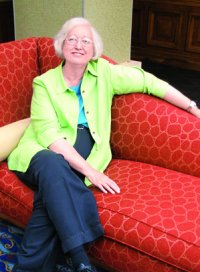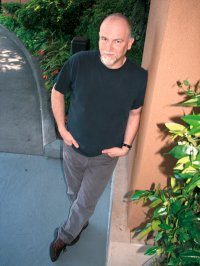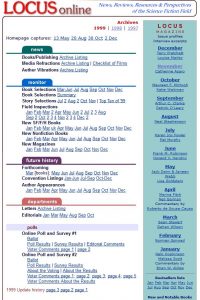Connie Willis: All Clear

Connie Willis was born in Denver CO and has lived in Colorado for most of her life. Her first SF sale was “The Secret of Santa Titicaca” (1971), and she earned her first Hugo nomination for “Daisy in the Sun” (1979). In 1982, she published Hugo- and Nebula-winning novelette “Fire Watch” and Nebula-winning story “A Letter from the Clearys”, the first of her many award-winning stories, which so far include ten Hugos and six Nebulas — more than any other SF writer — and ten Locus Awards.
First novel Water Witch (1982) was a collaboration with Cynthia Felice; they also wrote Light Raid (1989) and Promised Land (1997) together. First solo novel Lincoln’s Dreams (1987) won the John W. Campbell Memorial Award, and her second, Doomsday Book (1992), won both the Hugo and Nebula and a Locus Award. Uncharted Territory and Remake (Locus Award winner and Hugo nominee) appeared in 1994, followed by Locus Award Winner and Nebula finalist Bellwether (1996), Hugo winner and Nebula nominee To Say Nothing of the Dog (1998), and Passage (2001), winner of a Locus Award and finalist for both the Hugo and the Nebula. Her next novel will be published in two parts in 2010: Blackout and All Clear.
Willis is a celebrated short fiction writer, and her award-winning works include “The Last of the Winnebagos” (1988, Hugo and Nebula), “At the Rialto” (1989, Nebula), “Even the Queen” (1992, Hugo, Nebula, and Locus), “Death on the Nile” (1993, Hugo), “Close Encounter” (1993, Locus), “The Soul Selects Her Own Society: Invasion and Repulsion: A Chronological Reinterpretation of Two of Emily Dickinson’s Poems: A Wellsian Perspective” (1996, Hugo), “Newsletter” (1997, Locus), “The Winds of Marble Arch” (1999, Hugo), “Inside Job” (2005, Hugo), and “All Seated on the Ground” (2007, Hugo).
Other notable stories, many of them award nominees, include “The Sidon in the Mirror” (1983), “Chance” (1986), “Spice Pogrom” (1986), “Schwarzschild Radius” (1987), “Time Out” (1990), “Cibola” (1990), “In the Late Cretaceous” (1991), “Jack” (1991), “Miracle” (1991), and “Just Like the Ones We Used to Know” (2003). Many of her stories have been collected in Fire Watch (1985), Impossible Things (1993), Miracle and Other Christmas Stories (1999), and The Winds of Marble Arch and Other Stories (2007).
Willis also edited anthologies The New Hugo Winners Volume III (1994, with Martin H. Greenberg), Nebula Awards 33 (1999), and A Woman’s Liberation: A Choice of Futures By and About Women (2001, with Sheila Williams). She is a frequent speaker and guest of honor at SF conventions, and much sought-after as a Toastmaster. Willis was inducted into the SF Hall of Fame in 2008.
Willis lives in Greeley CO with her husband Courtney, a physics teacher whom she married in 1967, and they have an adult daughter, Cordelia.
Excerpts from the interview:
“When we last talked, in 2002, I mentioned my plans for the time-travel novel All Clear. How grim, to still be working on it all these years later! I got the idea after 9/11. (I think I was a little crazy then, like the entire nation.) As time went by, the book changed in some ways, and in other ways it’s exactly what I set out to do. It is now two volumes and I have turned in both, but I have been working on revisions to volume one, which is now called Blackout. The second volume will be All Clear. They’re not really two books; they’re two halves of one book, and I end volume one with all my characters in a lot of trouble.
“Part of the problem was, it was too long even for two volumes — just enormously complicated. So it has taken me a long time to work on it, and has changed some in the process. Halfway through, I did something I’ve never done before: I decided I did not want the ending to be what I’d originally planned.
“I was feeling very apocalyptic after 9/11, and one of the images that prompted the book was the story about a young courier guy who was all by himself in an express elevator, taking the opportunity after a delivery to do soft-shoe routines and dance and sing, then all of a sudden the elevator stopped. Luckily, he was almost all the way to the bottom, but he sat in that elevator for a long time and heard muffled sounds from outside. At some point a fireman came by and shouted, ‘Is there anybody in there?’, and he called back. Then nothing. Eventually the sound stopped and the fireman hadn’t come back. So he just randomly pushed the buttons again. At that point, the cables were melting because the building was collapsing. So the door opened. He shot across the lobby, and he was one of the last ones out.
“What struck me about the story, aside from all the high drama, is that he had no idea what was going on, and no way to find out. The reality of what was happening, the horror of it, was beyond anything he could have imagined. So I thought, ‘That’s the situation I want to put my characters into.’ Only they‘re trapped in the past during World War II. They can’t get out, and they have no idea why: Is it something that’s happened to Oxford? Something that’s happened to the world? Something that’s happened to the future? Or all three? It’s a particularly terrifying situation, and although my characters have more freedom of movement and action than this poor guy in the elevator, it’s really the same situation.”
*
“All the genres are tools. One of my pet rants for years has been the idea that there’s no such thing as a good western, or romance, or any other form. We in the SF world are as guilty of this as anybody else. I’ve seen science fiction people who look down on fantasy people, who look down on the romance people. (I don’t know what’s below romance — probably confessions, and then porn.) As if one genre was inherently better than another. But all genres are good — and bad. There is no genre that can’t produce great art, and there is no genre so good that it can’t produce garbage — especially modern mainstream literature, which is full of garbage!”
*
“I’m still writing short fiction. I plan, when I’m free at last of these final novel revisions, to write a bunch of short stories before I start another novel. They sort of pile up and they’re all there, ready to go. Though I call myself a science fiction writer, romantic comedies are my favorite thing to write. To me they’re like sonnets: it all has to be within this very rigid form, and then within there you can play around as much as you want. It’s such a fertile field. You can write dozens and dozens of sonnets and they’re all different and they’re all terrific, and you can write dozens of romantic comedies. They’re snappy, they’re funny, they’re exciting — and they’re ironic, above all. They’re not earnest in any way. Romances are earnest. Jane Austen doesn’t really write romances; she writes romantic comedies!
“The next novel I plan to work on, the one I abandoned on 9/11, will be a romantic comedy/Road Picture thing about UFOs and Roswell and alien abduction. That’s Road Picture like the ones Bing Crosby and Bob Hope used to do, not Road Trip. Road Trip movies now are a bunch of guys belching their way across country and boinking people, and fart jokes. In the Road Picture, you have a journey where people figure out all kinds of things about themselves. It’s a classic form, more in the movies, though I guess quest stories fit into that too.”
This interview and more like it in the October 2009 issue of Locus.
 While you are here, please take a moment to support Locus with a one-time or recurring donation. We rely on reader donations to keep the magazine and site going, and would like to keep the site paywall free, but WE NEED YOUR FINANCIAL SUPPORT to continue quality coverage of the science fiction and fantasy field.
While you are here, please take a moment to support Locus with a one-time or recurring donation. We rely on reader donations to keep the magazine and site going, and would like to keep the site paywall free, but WE NEED YOUR FINANCIAL SUPPORT to continue quality coverage of the science fiction and fantasy field.






